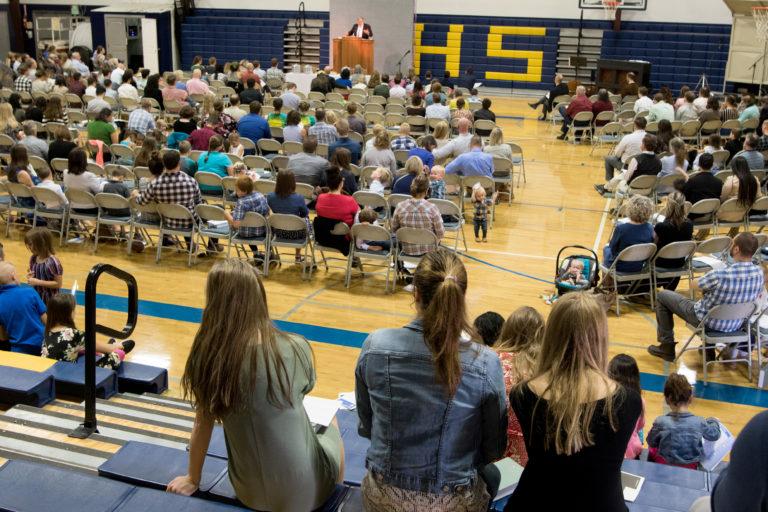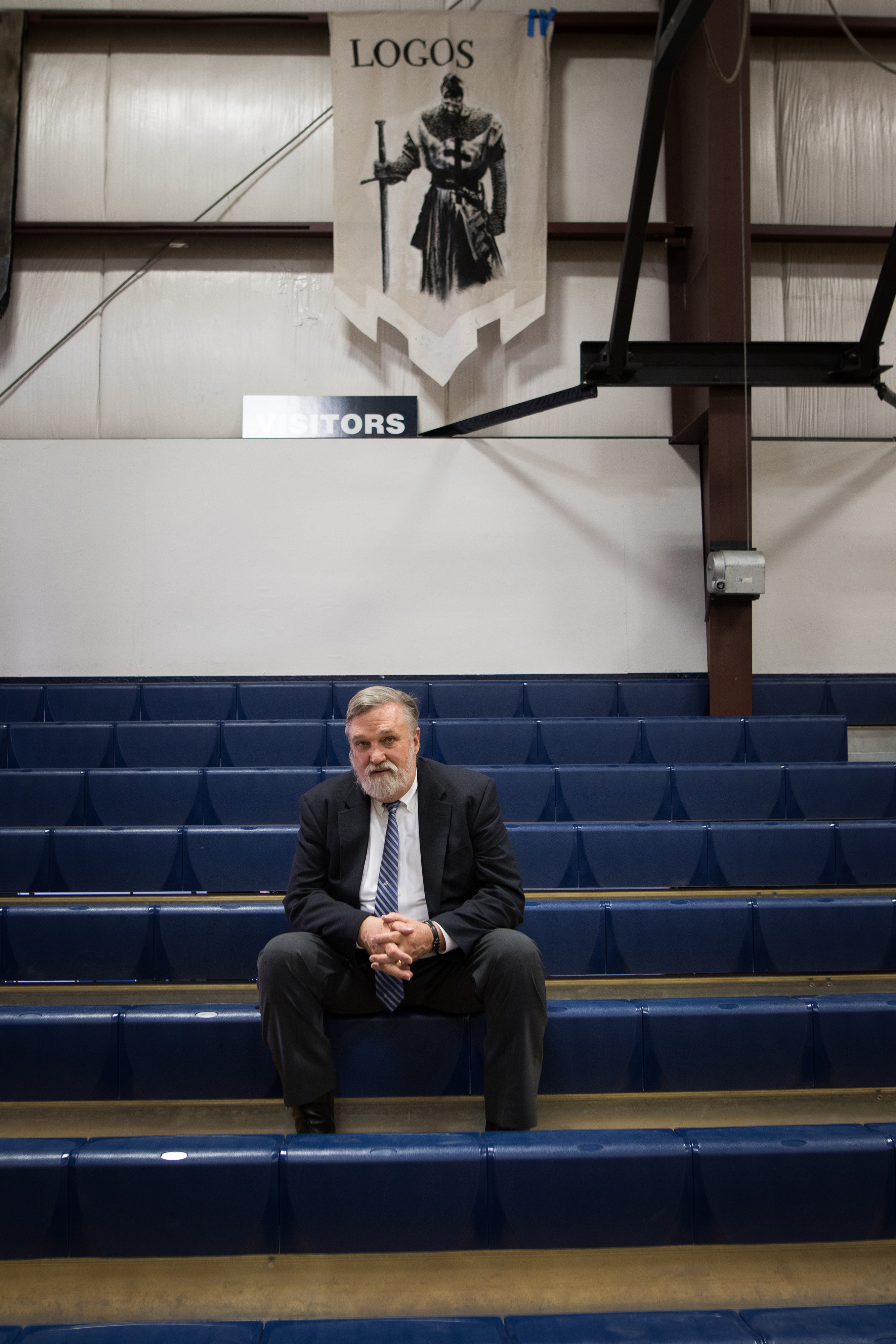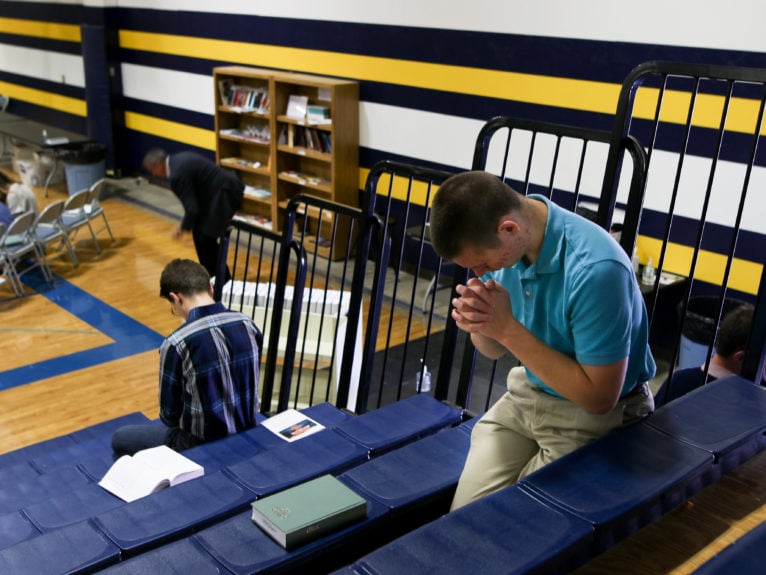American evangelicals still see Trump as their anointed one. Why?
Adnan R. Khan: Fundamentalists are readying themselves for a confrontation with liberal secularism, with Trump as their crusading knight

Worshippers in Moscow, Idaho, listen to Pastor Doug Wilson’s sermon at the Logos School. (Photograph by Adnan R. Khan)
Share
When you walk into the Sunday service at the Logos School in Moscow, Idaho, something feels off right from the beginning. It’s not so much the small army of children running and giggling in the K-12 school’s playground, but rather their mothers: they are conspicuously young, a few barely out of their teens, and some looking like they should still be students at the school. Their appearance and simple math suggest they could not have given birth to the three or four children each is corralling into the gymnasium as the services begin. Not unless they began at a shockingly young age.
Inside, Logos’s gym looks like that of a typical high school, with stow-away bleachers and retractable basketball hoops and banners commemorating past sporting successes—a regional basketball championship, a state title in volleyball. The only difference is the half-dozen or so large banners bearing the images of crusader knights, in full armour, swords drawn, ready for battle.
Logos prides itself on being a “classical Christian” school that offers a “Christ-centred education.” It attracts many conservative evangelical families who live in and around Moscow, pop. 25,800, but is particularly popular among those who follow Christ Church, headed by Pastor Doug Wilson.
READ MORE: The stark, unbridgeable divide between rural and urban America
Wilson leads this Sunday’s services at the school gymnasium, one of three that Christ Church holds every Sunday in Moscow serving a community that has ballooned to an estimated thousand members—in no small part due to all those young women having all those children (“Secular families have one or two children,” Wilson will tell me later, proudly. “Ours have six or seven.”)
Wilson’s views have, for obvious reasons, ignited some intense and acrimonious debates in Moscow, a historically liberal college town that is home to the University of Idaho, while Washington State University lies just eight miles away, across the state line. It is, as its long-time progressive residents like to say, a “tiny blue dot in a sea of red.”
But things are changing. In the 1960s, a fiery religious fundamentalist named James Wilson decided to set up his evangelical mission in the town. The choice was strategic: because of Moscow’s location between two universities, Wilson believed it offered unique opportunities for evangelism, challenging what his followers to this day claim is the secular “indoctrination” young people receive at universities. Secularism, they say, has undermined the ordained patriarchal order, weakening men and assigning roles to women which they are not equipped to handle.

Wilson’s teaching, outlined in his book, Principles of War: A Handbook on Strategic Evangelism, was, as the title suggests, an attempt to re-establish a more “muscular Christianity”, according to Nick Gier, professor emeritus of philosophy at the University of Idaho, who knew both James Wilson and his son Doug. In his critiques of the Christ Church movement, Gier describes an ideology obsessed with reclaiming manliness in Christian doctrine, where “only propertied males should vote,” because “misguided women might decide to cancel out their husband’s wise choices in church and political matters,” Gier wrote in 2010.
Pining for a manlier America resonates with the persistent frontier-ism in small town U.S.A. Doug Wilson has successfully harnessed his father’s message to rapidly expand his congregation while launching related enterprises. Christ Church now owns a number of successful businesses in Moscow, runs a private college, and is planning to build a massive cathedral to meet the needs of its growing flock.
To the dismay of the town’s liberals, the church also actively encourages followers in other parts of America to move to Moscow, with the goal of transforming the town into an evangelical Christian home base from which to prepare for the inevitable collapse of secularism and the rise in its place of the Kingdom of God.
The Sunday service I attended is dedicated to this theme. Wilson spends the good part of an hour riffing on the power of prophecy and the importance of preparing for God’s judgment. He repeatedly extols the virtue of “donning breastplates;” good Christians, he says, are always prepared to battle in the way of God.
After the service, Wilson tells me the imagery is meant as metaphor. Christians should be “spiritually” prepared for God’s judgments, he emphasizes: “We’re at the end of a peculiar civic-political order now. The liberal public square that was dominant during the 20th century is coming to pieces, because of good old-fashioned sin.”
I’ve heard that sentiment often, in a variety of iterations, during my journey across America. Some people believe this moment in history represents the end of times—the second coming of Christ, Judgment Day and all those apocalyptic fever dreams. Others, like Wilson, believe we are in the midst of one of God’s smaller judgments, a punishment of sinners in the same vein as the sacking of Jerusalem in 70 CE.
What’s consistent throughout is the belief that Donald Trump and the coronavirus pandemic are somehow necessary agents to the proper functioning of God’s plan. Anyone who gets in the way is the enemy, an agent of darkness.
So it is that Moscow’s mask mandate, which requires masks in any public space, indoor or outdoor, where proper social distancing cannot be maintained, is met with fury. Protesters of the order, all supporters of Wilson and Trump, have warned of dire consequences if they are forced to relinquish their God-given right to refuse to wear a mask.
At the Christ Church Sunday service, where no one but my wife and I has their face covered, one congregant tells me masking is really not necessary. “We’ve had much bigger gatherings than this and we haven’t had an outbreak,” he says. “Our prayers protect us here.”

In recent days, Trump has used his own positive coronavirus diagnosis to leverage that belief in Divine intervention in a naked attempt to ramp up his own sputtering campaign. In a video posted on his Twitter account on Oct. 7, shortly after his release from the Walter Reed Medical Center, Trump called his diagnosis a “blessing from God.” Only two days earlier, right wing media had lit up with headlines announcing Trump’s miraculous recovery. “Prayers For Trump From Christians & Others Lead To Miracle At Walter Reed,” one headline read.
Wilson defends his calls for his congregation to flout the mask mandate. His goal is not to tell others what they should or should not do during this pandemic, he tells me. “But I want to remind people that in the Constitution, we have the right to peaceably assemble and we have the right to religious worship. Exercising those ought not to be controversial.”
He skirts the question of how temporary orders to wear face masks or social distance during a pandemic in which a highly infectious disease spreads through the air constitute a breach of those rights. Local health officials argue that the group’s rights have in no way been violated; they may gather in public places and demonstrate, as long as they are social distancing or, if not, then wearing masks.
But Wilson is famous for taking his arguments through a maze of seemingly logical propositions before popping out on the other side with rather dubious QEDs. He has argued, for instance, that allegations of misogyny against him are unfounded. If people would only see things from his perspective—one based on a literal reading of the Bible—they would understand, he opines, that restricting women to being homebound baby-makers is honouring womanhood, not demeaning it.
RELATED: Amy Coney Barrett and the challenge of separating church and state
But it’s not long before the pretzeled logic of religious fundamentalists who fancy themselves intellectuals crumbles, revealing the ideological impetus behind their arguments. During his sermon, Wilson offers up prayers for Amy Coney Barrett, Trump’s Supreme Court nominee. Like all evangelicals, there are two basic goals in his mission to get Trump elected again, and they have nothing to do with the American Constitution: repeal abortion and LGBTQ rights.
It’s hard, when this agenda reveals itself, to fend off unsettling images of The Handmaid’s Tale and other misogynistic dystopias. Wilson’s doublespeak glosses over the unsettling fervour with which people like he are now grasping for victory in next month’s elections. Others are much less subtle. In Broadus, Mont., Jane Thompson, an antique shop owner, told me she firmly believes Trump, despite all his faults, has been anointed by God to carry out the mission of making America godly again. “God often chooses imperfect people for His purposes,” she told me.
Another customer browsing in the shop added: “I totally agree. You know, even King David was a bit of a ladies’ man.”

More astonishing still is how widespread in rural America is the belief that the hand of God is working miracles through an excessively-tanned and obese former reality TV personality. Yet according to exit polls in the 2016 elections, fully one-third of Trump’s votes came from evangelicals. So, for the purposes of trying to understand Trumpworld, I have to treat this line of thinking seriously.
It is sometimes exceedingly hard. When I began this journey through Trump’s America, I convinced myself that I would be fair and open to the perspectives of people who support him. A month and a half later, I like to think I have been. I still feel sympathy for rural Americans and their fears of losing idyllic lives to the relentless march of urbanization. I feel like I have a more nuanced understanding of how the breakdown of America’s political and economic institutions have created a space where grievances from the left and the right overlap. There are core issues in America upon which everyone agrees. If those exist, then there is hope that the polarization in American society can be overcome.
Still, as I’ve gone deeper down the Trumpian rabbit hole, things have gotten decidedly darker. I’ve been called a terrorist (more on that in another dispatch) and treated with disdain for wearing a mask. I’ve been told, repeatedly by Trump supporters that the only way the Democrats can win is if they cheat.
The fervour for Trump—especially in rural Montana, Wyoming and Idaho—is of the cultish variety seen at Trump rallies. Many progressives like me, understandably, dismiss it. But as W.I. Thomas, the late 19th– and early 20th-century American sociologist, once said, “something is real if it is real in its consequences.” And the consequences of Donald Trump currying favour with the religious right—from his attacks on secular institutions to his nomination of a judge they expect to curtail abortion rights—are very real.
At the end of Sunday service at Christ Church, Doug Wilson takes a seat at the exit to the Logos School’s gymnasium with a bucket of Hershey’s Kisses in his lap. A flurry of children dart in and out of our conversation, grabbing handfuls of candies and running off into the sea of grownups milling around and talking.

Wilson apologizes for the armed guard he had posted next to me throughout the course of the service. “We’ve had a few death threats,” he tells me. “The political climate is very tense right now.”
I tell him that most of the congregants I’ve spoken to say they will be voting for Trump.
“Yeah,” he laughs. “You won’t find many Biden supporters here.”
The prospects, I point out, don’t look very promising for Trump: “What do you think your followers will do if Biden wins the election?”
“We’d get ready for persecution,” he says. “I would expect Joe Biden to have no respect whatsoever for my religious liberty. I believe we would have to go underground.”
What exactly his followers would do then remains unclear, but Wilson says the possibilities worry him. “Eight million people in this country are new gun owners,” he says. “That’s eight million people who never owned a gun before. So yeah, I’m worried.”